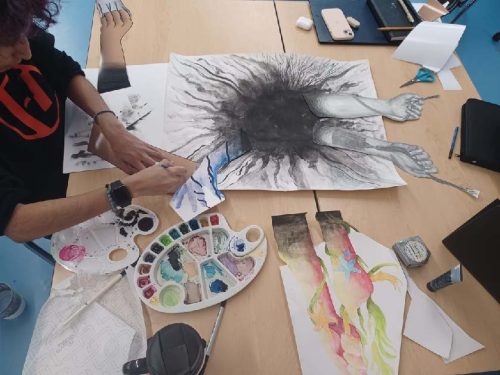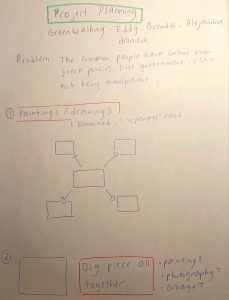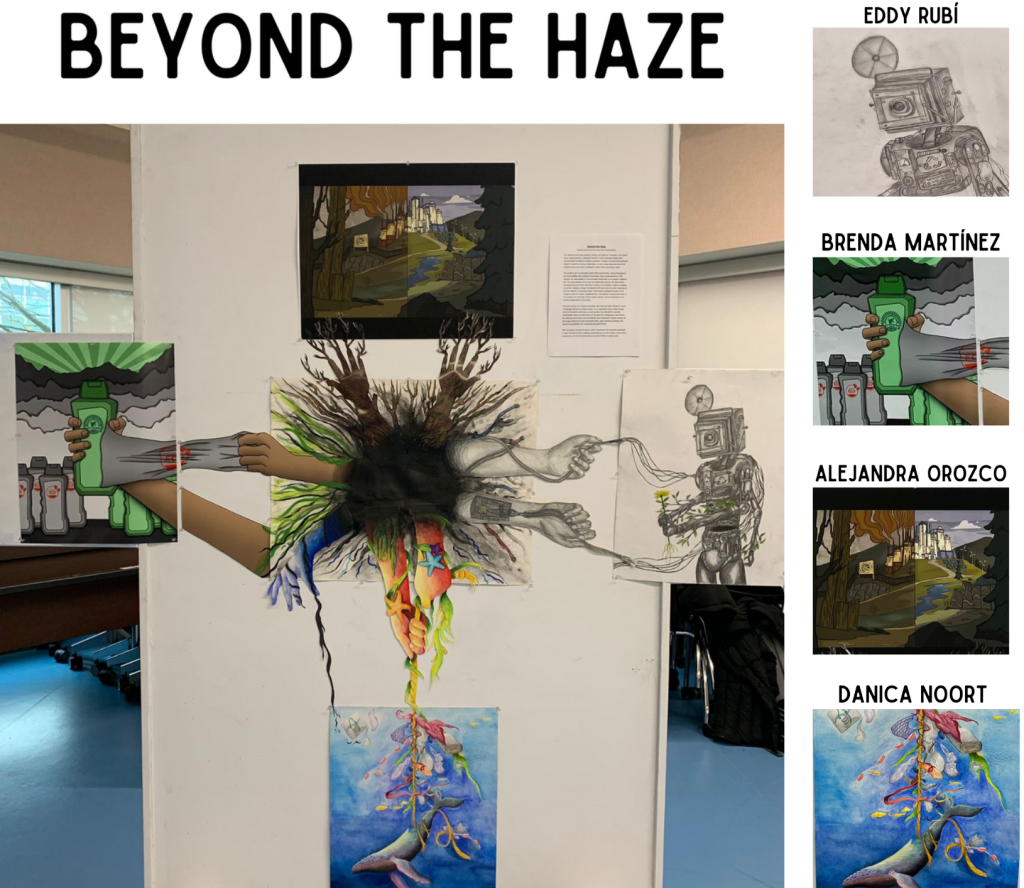Written by Anna Griffith
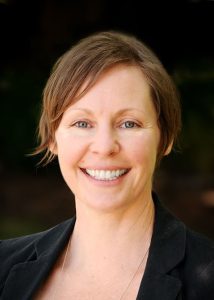 Over the past eight years, I’ve inadvertently been working on changemaking. I called it decolonizing the classroom, negotiating the syllabus, enhancing collaborative interdisciplinary creativity to solve complex problems (through Creativity Labs), and transitioning from Education for Sustainable Development (ESD) to practicing regenerative education that enhances equity, diversity, and inclusion. While each of these projects and approaches represents changemaking and social innovation in action, I never labelled them as such—and, in some ways, I actively resisted doing so.
Over the past eight years, I’ve inadvertently been working on changemaking. I called it decolonizing the classroom, negotiating the syllabus, enhancing collaborative interdisciplinary creativity to solve complex problems (through Creativity Labs), and transitioning from Education for Sustainable Development (ESD) to practicing regenerative education that enhances equity, diversity, and inclusion. While each of these projects and approaches represents changemaking and social innovation in action, I never labelled them as such—and, in some ways, I actively resisted doing so.
There are various definitions of changemaking, all resonating with the idea of creating positive change in the world. While I support this idea, the term changemaking didn’t sit well with me. It felt like an all-encompassing concept that risked diluting or absorbing important nuances of specific socially engaged work—the paradigm shifts required for Indigenization and decolonization, the social justice focus of equity, diversity, and inclusion (EDI) work, the urgency of sustainability, or the ethical underpinnings of trauma-informed approaches.
But over the past two years of deeply engaging with the concepts of social innovation and changemaking I’ve come to see it as an amplifier—a way to articulate the importance of each initiative and the change it creates in the world, highlighting their interconnections within an ecosystem of change. For instance, we can’t discuss sustainability without touching on Indigenization, decolonization, social justice, or trauma.
Today I understand changemaking as an umbrella term that can help us to generate momentum, amplify the effect our work has, and help us to articulate essential human skills necessary to navigate the complexities of our world and the challenges we face.
Changemaker Education in Post-Secondary Institutions
Changemaker education has gained traction in post-secondary institutions, with the Ashoka Changemaker Campus designation leading the way. This designation “recognizes colleges and universities around the world with a proven track record of campus-wide excellence for social innovation and changemaking.” Institutions in this network empower students, faculty, and staff to imagine an approach to higher education that fosters innovation and entrepreneurial thinking, advancing higher education as a force for social impact.
Ashoka defines a changemaker as “someone who is taking creative action to solve a social problem,” emphasizing empathy, thoughtfulness, creativity, and collaborative leadership. These skills, although essential, are often absent from traditional education.
Outside of Ashoka, there is growing literature on social innovation education, which centers on transformative, action-oriented learning. Students gain changemaking skills by working on real-world problems and contributing creative solutions. The World Economic Forum (2024) describes social innovation education as “a transformative approach to collective problem-solving that transcends disciplinary boundaries, involving citizens and changemakers from all walks of life in tackling the world’s most pressing issues.” Warren Nilsson (2023) argues in the Sanford Social Innovation Review that traditionally, Leadership Schools focus on social innovation through developing individual change agents/leaders, but the curriculum of social innovation is inherently collaborative. He believes that fostering resilient systems requires collective efforts, which university classes are uniquely positioned to cultivate.
The UFV Approach to Changemaker Education
In my role as Changemaker Curriculum Developer in UFV’s Teaching and Learning Centre I conducted an ecosystem scan of course outlines to identify where changemaking is already embedded at UFV, and to begin articulating what we mean when we say changemaker education.
This led to the development of a Changemaker Education Matrix that brings together UFV’s priorities and commitments articulated in the Institutional Learning Outcomes, the working principles of changemaking that UFV has been known for and aspires to, along with specific dimensions of changemaking surfaced in the ecosystem scan and emphasized in the literature. These are outlined below:
Four Principles of Changemaking at UFV:
Key Changemaker Competencies:
|
For me, this matrix is a way for us to see the ways many of our courses contribute to and foster skills of changemaking.
But what does this look like in practice? The possibilities are endless and look different depending on the instructor and disciplines involved. At UFV we have incredible people working to bring changemaking into their classes through the TIPP fund, which we will feature later this year. I can also share with you my own approach in SOCA 401: Critical Theory for Creative Arts.
Changemaking in Practice: SOCA 401
I have taught SOCA 401: Critical Theory for Creative Arts for three years, focusing on theories that help students understand our current moment and imagine how their creative work can be used for arts-based social innovation.
We interrogate the legacies of colonialism, capitalism, and other systems of power. We explore the ethics of AI, relationality, decoloniality, pluriversality, and futures thinking. The class embraces complexity and encourages open discussions about feelings of overwhelm, despair, and hope.
Talking through these topics develops Changemaker Knowledge, but taking action is equally important. Students engage in a semester-long interdisciplinary problem-based learning project that culminates in a transdisciplinary arts intervention. Through this they practices Changemaker Qualities and Changemaker Capacities.
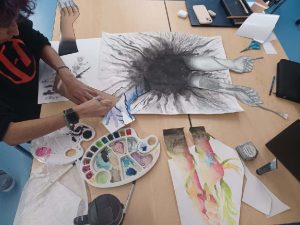 SOCA 401 Interdisciplinary Problem-Based Learning Process:
SOCA 401 Interdisciplinary Problem-Based Learning Process:
- Identify a Problem: Students form groups around meaningful issues and problems they want to address.
- Conduct Systems Analysis: Students analyze and map the relationships, patterns, and underlying structures within a complex problem. They consider the various stakeholder and disciplinary perspectives needed to understand and address the issue.
- Research Across Disciplines: Each student explores three different disciplines and perspectives, resulting in diverse insights.
- Data Mapping: Students identify themes, patterns, and omissions in the data they gathered.
- Futures Thinking Exercises: Using major themes from the data mapping students develop possible future scenarios.
- Create an Arts-Based Intervention: Groups design art-based interventions to illustrate or critique their findings.
In our final class, students showcase their work in an Open Studio, where guests engage with their projects and hear their insights. The group who worked on The Gertrude Trials* created a humorous, interactive, choose-your-own-adventure game exploring future scenarios involving AI integration and containment. Another group of students developed a project titled Beyond the Haze, which focused on trajectories related to greenwashing.
The Impact of Changemaker Education
Changemaker education reenergizes both learners and educators. When students work on projects that make a tangible difference, they are empowered. Learning becomes experiential, and students develop critical skills that serve them in all areas of life.
For instructors, integrating changemaking requires rethinking how their discipline connects to pressing global issues and how classroom learning can drive change beyond university walls. It demands creativity, flexibility, and a willingness to learn alongside students. It requires humility and curiosity.
In my experience this approach can combat burnout, despair, and cynicism—things we desperately need to address now more than ever. To thrive in an unraveling world, we must develop resilience and adaptability. Changemaker education offers a path toward these capacities.
Moving Forward
Integrating a changemaker mindset will look different for everyone, but at its core, it’s about contributing meaningfully to the world in this critical time. As wave after wave of disruption lands, we must maintain a clear vision of the future we are working towards, staying agile and flexible as we work around obstacles. We will need to forge new alliances and work across differences. It will mean checking our egos and learning alongside students, working together to make a difference. I firmly believe that changemaking can be woven into every discipline. If you’re skeptical or disagree with this approach, I want to hear from you and learn from you—and the first round of coffee is on me.
*The Gertrude Trials artists: Nelson Frota Colares, Noah McGuire, Jie Yang, Alicja Hardy-Francis, Luke Niessen, and Baljot Marharu.

